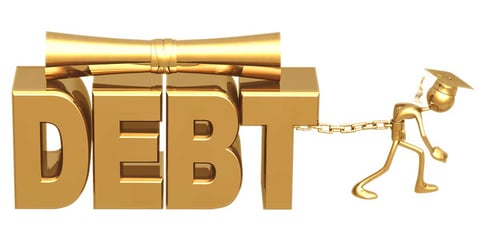3 Things I Did to Pay Off My Student Loans in One Year
The internet is full of stories about college grads who paid off their loans in record time. But when you're saddled with debt, it often seems impossible. How exactly does someone go about not only taking control over their student loan debt, but eliminating it all together—especially when you don't even have a grasp on your day-to-day finances?
I was in the same boat. Post college, I struggled for years to make ends meet and avoided the elephant in the room (i.e. student loan debt). Eventually, I decided that I was ready to be debt-free. And within a year of making the decision, I paid off more than $16,000 in student loans.
It was a challenge, and it definitely required me to to change my perspective about my financial life.

Here are the three things I did to pay off my debt within one year of getting serious about tackling my finances.
1. Found a more affordable apartment
Rent is probably the biggest expense you have; it was definitely mine. I was paying $895 for a one-bedroom apartment in a wonderful neighborhood, not including utilities. But at the time, I was only making $32,000 a year. Taking utilities, groceries, bills and student loans into account, I was literally living paycheck to paycheck.
This made me realize I needed to reduce my spending. So I started looking for smaller, more affordable places. Since I couldn't afford housing in the neighborhood I lived in, I expanded my search to include neighborhoods close by, that were still close to the amenities that I needed but where housing was more in line with my budget.
I downgraded from a 800-square-foot apartment to a 400-square-foot one that was only $495. For that price, it wasn't perfect: there was no central air conditioning (in Texas), and it was bare-bones.
But it worked, and it helped me start digging myself out of debt by allowing me to pay a few hundred dollars on the student loans each month that I had neglected for years.
2. Increased my income
If I was going to have any chance at being debt-free, I knew that I would need to make more money. Even after moving to a more affordable apartment, my income was limiting how much I could actually pay toward my student loans.
So I left my severely underpaid, $32,000-a-year journalism job and took a job in corporate communications, where I'd get to write but where my salary would finally allow me to pay off my debt.
My new job paid me $55,000 as a starting salary. A few months into new job, I began paying $1,000 or more (sometimes upwards of $2,000) toward my student loans each month.
Of course, getting a new job isn't always possible. But there are other ways to increase your income, like getting a side hustle.
3. Started budgeting
One important thing to note with an increase in salary and a lower rent payment is that you suddenly have a lot of extra cash. When you find yourself in this position, it's easy to fall into the trap of lifestyle creep — when your standard of living changes and gets more expensive as your discretionary income rises. This is something I worked hard at avoiding.
Though I have a penchant for expensive shoes and makeup, I made it my mission to pay off my student loans. So I made a budget that included my take-home pay, my financial obligations, and my spending habits. I not only stuck with it but I also cut down my expenses even further. I went out less, cooked at home more, and decided not to travel for a full year until I accomplished my goal.
These three things ultimately helped me put more money into my student loans each month. I paid off the rest of my debt completely within a year, and I made more progress in a single year than I had the five years earlier. It also helped me start building my savings.
See also: After 5 Years of Struggle, Here's the 1 Tip That Finally Wiped Out My Student Loan Debt
You can do it, too
One thing that wasn't on my radar screen back then was refinancing my student loans. Refinancing to a lower interest rate would've helped me pay off my loans even faster, and even save some money along the way.
How much could you save by refinancing? Use our Student Loan Refinancing Calculator to find out.
